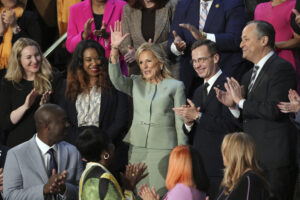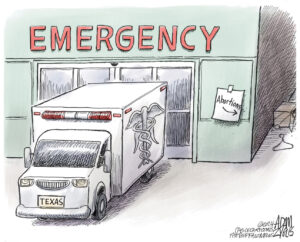Trump Continues Interviews With Supreme Court Candidates
Top contenders to replace retiring Justice Anthony Kennedy include federal appeals Judges Raymond Kethledge, Amul Thapar, Brett Kavanaugh and Amy Coney Barrett.WASHINGTON — President Trump spoke with three more potential Supreme Court candidates on Tuesday as a key senator privately aired concerns about one of the contenders.
That follows four Trump interviews with judicial candidates a day earlier, as well as a conversation with Republican Sen. Mike Lee of Utah, who is not regarded as a top contender. An administration official said Trump had spoken to seven candidates in total.
“These are very talented people, brilliant people,” Trump said during an appearance in West Virginia. “We’re going to give you a great one.”
With trademark flair, Trump has said he’ll announce his pick to replace retiring Justice Anthony Kennedy on Monday, choosing from a list of 25 candidates vetted by conservative groups. Top contenders include federal appeals judges Raymond Kethledge, Amul Thapar, Brett Kavanaugh and Amy Coney Barrett.
Trump has also been consulting with lawmakers — including Sen. Rand Paul, R-Ky., who has expressed reservations about Kavanaugh’s candidacy, according to a person familiar with the call.
Paul has told colleagues that he wouldn’t vote in favor of Kavanaugh if the judge is nominated, citing Kavanaugh’s role during the Bush administration on cases involving executive privilege and the disclosure of documents to Congress.
Trump’s choice to replace Kennedy — a swing vote on the nine-member court — has the potential to be part of precedent-shattering court decisions on abortion, health care, gay marriage and other issues.
On Monday, Trump interviewed Kethledge, Thapar, Kavanaugh and Barrett, according to a person with knowledge of the meetings who was not authorized to speak publicly about them.
The White House did not disclose Trump’s additional conversations, but two other names considered top contenders are Thomas Hardiman, who has served with Trump’s sister, now on senior inactive status, on the 3rd U.S. Circuit Court of Appeals in Philadelphia; and Joan Larsen, who serves on the federal appeals court in Cincinnati and previously served as a Michigan Supreme Court Justice.
The president also spoke by phone with Lee on Monday, as first reported by the Deseret News and later confirmed by the senator’s office, which characterized it as an interview. Asked about the call, White House spokesman Raj Shah said only, “Yesterday, the President spoke on the phone with Sen. Mike Lee.” Lee is the only lawmaker on Trump’s list of potential justices.
Since Trump said his short list includes at least two women, speculation has focused on Barrett, a former law clerk to Justice Antonin Scalia and a longtime Notre Dame Law School professor who serves on the U.S. Court of Appeals for the 7th Circuit.
Conservative groups rallied around Barrett after her confirmation hearing last year featured questioning from Democrats over how her Roman Catholic faith would affect her decisions.
“There’s little doubt from the movement perspective that Barrett would be an excellent choice. It also might make sense politically,” said Tom Fitton of the conservative group Judicial Watch. He said Barrett “has been through the fire in terms of an unpleasant confirmation hearing. There won’t be much new under the sun.”
Barrett has won some high-profile praise, with former House speaker and Trump ally Newt Gingrich tweeting Monday: “Judge Amy Coney Barrett would make an outstanding Supreme Court Justice. Her clarity and intellectual strength in the Senate hearings for her current judgeship showed an intellect and a depth of thought that would be powerful on the Supreme Court.”
But her short tenure on the bench may work against her. And Democrats claim that Barrett — like the other picks — would favor overturning Roe v. Wade, the 1973 case that affirmed a woman’s right to abortion, and would weaken President Barack Obama’s 2010 health care law.
Brian Fallon, who is heading a group opposing Trump’s judicial picks, said Barrett had been outspoken on both issues, adding, “I wouldn’t be intimidated at all if that’s the direction that they go.”
During his 2016 campaign and presidency, Trump has embraced anti-abortion groups and vowed to appoint federal judges who will favor efforts to roll back abortion rights. But he told reporters Friday that he would not question potential high-court nominees about their views on abortion, saying it was “inappropriate to discuss.”
Sen. Susan Collins, R-Maine, has said she would oppose any nominee she believed would overturn Roe v. Wade, stressing she wants to back a judge who would show respect for settled law such as the Roe decision.
Without Kennedy, the high court will have four justices picked by Democratic presidents and four picked by Republicans, giving Trump the chance to shift the ideological balance toward conservatives for years to come. Both Chief Justice John Roberts and Neil Gorsuch, Trump’s first pick to the high court, have indicated more broadly that they respect legal precedent.
Currently the court has three women justices, all appointed by Democrats.
___
Associated Press reporters Mark Sherman, Hope Yen and Lisa Mascaro contributed to this report.
Your support matters…Independent journalism is under threat and overshadowed by heavily funded mainstream media.
You can help level the playing field. Become a member.
Your tax-deductible contribution keeps us digging beneath the headlines to give you thought-provoking, investigative reporting and analysis that unearths what's really happening- without compromise.
Give today to support our courageous, independent journalists.






You need to be a supporter to comment.
There are currently no responses to this article.
Be the first to respond.